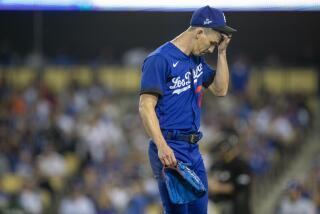Pursuit of Baseball’s Drug Users Heats Up
- Share via
Major league pitcher Jason Grimsley secretly cooperated with federal investigators, implicating himself and numerous players in illegal drug use, according to a 20-page FBI affidavit certain to shake professional baseball.
The former Angel pitcher, released by the Arizona Diamondbacks at his request Wednesday after the affidavit was disclosed, admitted longtime personal use of performance-enhancing drugs.
A copy of the affidavit released to the public blacks out the names of players and others identified by Grimsley, but it includes other provocative claims and disclosures, among them:
* That amphetamines were widely used throughout the big leagues. “Grimsley stated that until last year major league clubhouses had coffee pots labeled ‘leaded’ and ‘unleaded’ for the players, indicating coffee with amphetamines and without,” the affidavit said.
* That Latino players and major league teams based near the Mexican border had easy access to such drugs. “He stated that he got amphetamines from Latin players whenever he needed them,” the affidavit said.
* That he, like others, altered their drug use after testing positive in 2003. “Grimsley stated that since Major League Baseball began its drug testing ... the only drug that he has used is human growth hormone,” the affidavit said.
A team of federal agents tracked a shipment of human growth hormone kits to Grimsley’s Scottsdale, Ariz., residence in April.
Confronted at his door by investigators, Grimsley turned over the drugs and volunteered to cooperate, according to the affidavit signed by Jeff Novitzky, an FBI special agent assigned to the long-running investigation of the Bay Area Laboratory Co-Operative, or BALCO.
At the request of federal agents, Grimsley also placed a phone call to his supplier that was monitored by investigators. He said he had made similar orders -- for two kits costing $1,600 each -- on approximately 10 to 12 occasions, the affidavit said.
The affidavit was filed in the U.S. District Court in Phoenix in order to obtain a court-authorized warrant to search Grimsley’s home. The player stopped cooperating, the FBI document said, after he retained a defense lawyer.
Novitzky and 12 agents raided the house Tuesday and the affidavit was made public. It was first disclosed by the Arizona Republic.
The fallout -- beyond Grimsley’s release by the Diamondbacks -- is expected to touch more players, potentially revealing a network of steroid, human growth hormone, or HGH, and amphetamine distribution.
It comes at a time of heightened enforcement of Major League Baseball’s drug policy and an investigation led by former Sen. George S. Mitchell.
Grimsley said amphetamines, which were banned for the first time this season, were readily available and widely ingested in baseball circles.
Grimsley told investigators that amphetamines were provided by a bat and shoe salesman in the Angels clubhouse when he played for the team in 1996.
A handful of major league players -- Barry Bonds, Jason Giambi, Gary Sheffield and Benito Santiago, among others -- testified before a federal grand jury in the BALCO investigation. The case led to guilty pleas from four of the accused, including BALCO founder Victor Conte and Bonds’ trainer Greg Anderson.
The players were granted immunity in exchange for their testimony. Another grand jury is investigating Bonds for possible perjury.
The investigation into Grimsley, however, establishes a more aggressive approach by investigators toward players they believe bought, used and distributed illegal performanceenhancing drugs.
U.S. Atty. Kevin V. Ryan, based in San Francisco, said in a statement: “We continue to investigate allegations of illegal activities concerning steroids, amphetamines, and other performance-enhancing drugs, and related violations of law. We will continue to diligently follow the evidence. Clearly, we’re not done.”
Baseball Commissioner Bud Selig authorized an “independent” investigation of baseball’s steroid history this spring, though his choice of Mitchell was widely criticized because the former Senate majority leader is affiliated with the Boston Red Sox.
Grimsley, 38, has played for four teams in the last six years. Authorities suspect he distributed drugs as well as used them, according to the affidavit. He acknowledged using steroids as long ago as the 2000 season after he underwent shoulder surgery.
“Human growth hormone ... is a problem for all sports because there is no universally accepted and validated test -- either blood or urine,” Major League Baseball Senior Vice President Rob Manfred said in a statement.
“No governing body in any sport has ever been able to discipline an athlete for the use of HGH. Major League Baseball understands that its policy must continue to evolve to keep pace with scientific development,” Manfred said.
Rep. Henry A. Waxman (D-Los Angeles) called the lack of a reliable HGH test “a huge loophole” in baseball’s existing drug policy.
Baseball recently approved a grant proposal by Dr. Don Catlin, director of the UCLA Olympic Analytical Laboratory, to develop a urine test for detecting HGH. He said the “degree of difficulty is extraordinary.”
“There’s so much noise out there -- everybody knows it’s undetectable so they can take it with aplomb,” Catlin said.
“There’s a lot of information to suggest it does enhance human performance. The word on the street and the lore among athletes is that it really does work.”
Kansas City Royals first baseman Mike Sweeney, a former teammate who spoke to Grimsley by telephone Wednesday, said his friend “made a mistake.”
“He seemed as good as he can be at a time like this,” Sweeney said. “He told me there are some things being said that aren’t true.
“I never saw Jason use it. I didn’t know he was using anything. I was surprised.”
Grimsley broke into the majors as a starter with the Philadelphia Phillies in 1989. He pitched for six more teams, including the World Series champion New York Yankees in 1999 and 2000. He played last season for the Baltimore Orioles, where teammate Rafael Palmeiro was suspended after testing positive for an anabolic steroid.
His career record is 42-58, with a 4.77 earned-run average.
*
Brown reported from Kansas City, Mo., and Cohn from Los Angeles
More to Read
Go beyond the scoreboard
Get the latest on L.A.'s teams in the daily Sports Report newsletter.
You may occasionally receive promotional content from the Los Angeles Times.










